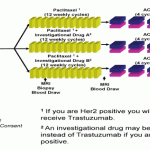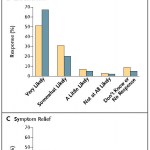cancer
My summer road trip took me through the scenic State of Oklahoma. As I drove heading north through the Sooner country, billboards line I-35. They didn't advertise restaurants, gas stations, insurance firms or country stores. Billboard after billboard promoted one or more casinos in the State. I wondered how it was possible for a rather sparsely populated locale could support what seemed like dozens of casinos. One particular billboard caught my eye. It read: "The only smoke-free casino in Oklahoma."
There are 94 casinos in Oklahoma owned by 33…
I've spent a lot of time on this blog discussing failures of the medical system. Usually, such discussions occur in the context of how unscientific practices and even outright quackery have managed to infiltrate what should be science=based medicine (SBM) in the form of so-called "complementary and alternative medicine" (CAM) or "integrative medicine," in which the quackery of alternative medicine is "integrated" with SBM. However, as big a problem as the infiltration of unscientific CAM practices into medicine is, there is a threat at least as grave here in the U.S. (and, I presume, in many…
Eric Merola alternates between offending me and making me laugh at his antics. Since it's been a couple weeks since I've written anything about the Houston doctor who claims to be able to do so much better against many forms of cancer than conventional medicine, I have to express a bit of gratitude to Mr. Merola for giving me today's topic for blogging. Mr. Merola, as you recall, produced two incredibly bad and deceptive movies lionizing that very same Houston cancer doctor as a brave maverick genius who's been kept down by The Man (i.e., the Texas Medical Board, the FDA, the National Cancer…
In medical school, or so we're told, aspiring young doctors are taught the fundamentals of medicine. What we science-based physicians usually mean by "fundamentals" includes the basic science necessary to understand human health and disease, the mechanism by which human disease develops, and the basics of how to treat it. We also learn a way of thinking about diagnosis and treatment, a systematic approach to differential diagnosis and how to hone in on a diagnosis based on history, physical findings, and imaging and laboratory tests. Fundamentals are important in any profession. Being a…
"Alternative medicine," so-called "complementary and alternative medicine" (CAM), or, as it's become fashionable to call it, "integrative medicine" is a set of medical practices that are far more based on belief than science. As my good bud and collaborator Mark Crislip so pointedly reminded us last week, CAM is far more akin to religion than science-based medicine (SBM). However, as I've discussed more times than I can remember over the years, both here and at my not-so-super-secret-other blog, CAM practitioners and advocates, despite practicing what is in reality mostly pseudoscience-based…
Finally! After far too much hullabaloo about the cost of regulations, there was a U.S. Senate hearing today on why public health regulations are important, and how delays by Congress and the Administration have serious negative consequences for people's lives. Senator Richard Blumenthal (D-CT) called the hearing entitled "Justice Delayed: The Human Cost of Regulatory Paralysis," the first one conducted by the Senate Judiciary Committee's newly created Subcommittee on Oversight, Federal Rights and Agency Action. The witnesses included a parent-turned advocate for automobile…
A drug currently used to treat colon cancer in people successfully treated a type of brain tumor, called a glioma, in a dog named "Petey". After removing the tumor, Dr. Simon Platt administered the drug to the brain where it prevented the tumor from returning. The next step is to conduct a larger study that includes more dogs. If successful, the drug may be used in clinical studies of humans to treat glioblastomas, a similar form of brain cancer that affects roughly 13,000 people annually and for which there is currently no cure.
Like yesterday's post, this will be a post that references our favorite dubious cancer doctor Stanislaw Burzynski but is not primarily about him. However, given the nature of the subject matter, it is impossible not to think of Burzynski, as comparisons are inevitable. Whereas yesterday all we were dealing with was a rather amusing "award" that Stanislaw Burzynski was awarded by a quack who had somehow conned a prominent Cardinal to give the Church's imprimatur on a Catholic medical order he wanted to resurrect to get other quacks to join, this week we're dealing with a serious subject:…
This is a post that is about Stanislaw Burzynski but not about Stanislaw Burzynski. Obviously, regular readers are more than aware who Stanislaw Burzynski is, but even though I just blogged about him a few days ago, I still feel obligated to recount briefly who he is, for the benefit of readers who might have arrived here through Google searches or other means. Stanislaw Burzynski is a famous "cancer doctor" (I use scare quotes because he is not an oncologist and has no clinical training in medical oncology yet practices as a medical oncologist) who discovered something he called "…
On July 15 and 16, about two dozen farmworkers paid an unprecedented visit to Capitol Hill to ask Congress, the Environmental Protection Agency (EPA) and the White House to support increased protection from exposure to pesticides. Farmworkers have lobbied Congress before, but this is the first time such a visit focused entirely on pesticide exposure issues, explained Farmworker Justice director of occupational and environmental health, Virginia Ruiz. Farmworkers are asking Congress to support strengthening the EPA’s Worker Protection Standard for pesticides, a regulation that has not been…
Time really does fly. It's hard to believe that it's been over a week since I gave my big (to me, at least) talk at TAM. It's equally hard to believe that it's been more than a week since I had the honor of being kicked out of Penn Jillette's Private Rock & Roll Bacon & Doughnut Party because back in February I had had the temerity to question whether it was a good idea for Penn & Teller to appear on The Dr. Oz Show. It was a surreal experience, to be sure, to be cussed out publicly (albeit with no mention of my name), kicked out of Penn's private party, and then to have had Penn…
Believe it or not, I'm going to do Eric Merola (who doesn't particularly like me, to the point of thinking, apparently, that I'm a white supremacist who doesn't like evidence but does like to eat puppies) a favor. Having been away at TAM, somehow I missed this. Well, actually, I didn't miss it, but somehow I forgot to post it. Then when I got home I still forgot to post it. Now there are only three days left (four, counting today) for me to do it; so I'd better get to it. My having forgotten to do this is particularly amazing given the subject of my main stage talk at TAM.
Eric Merola, as you…
As I write this, I'm winging my way home from TAM, crammed uncomfortably—very uncomfortably—in a window seat in steerage—I mean, coach).
I had thought of simply recounting the adventures of the contingent of skeptics with whom I'm associated who did make it out to TAM to give talks at workshops and the main stage and to be on panels, but that seemed too easy. Also Orac is just too damned egotistical, and, besides, it's a four hour flight. Even so, I would be remiss if, before delving into the topic of today's post, I didn't praise Steve Novella, Harriet Hall, and Mark Crislip, for their…
TAM is fast approaching, which means one thing (at least this year). I need to get my Plexiglass blinky posterior in gear in order to have my talks together in time. I spent part of yesterday doing that, but, unfortunately, I have to work today in order to help to make up for the clinic I'll be missing next week; so you'll forgive me if this post might look familiar to a subset of you who know where you might have seen some of this discussion before elsewhere. Those of you who haven't, you're in for some good blogging, if I do say so myself. Whichever group you belong to, we'll get back to…
Employers in British Columbia's (BC) construction industry recognized that workers were exposed to respirable silica and other rock dust. What they needed was a standard from the province's worker safety regulatory body on how to identify and control the hazard. The BC Construction Association, which represents 2,500 companies and the Council of Construction Associations (COCA) formally requested a standard on silica to fill the regulatory gap. In BC, worker safety regulations are proposed and adopted through their Workers' Compensation Board, part of WorkSafeBC. …
Lymphedema is a complication of breast cancer surgery that all surgeons who do breast surgery detest. Patients, of course, detest it even more. The limb swelling that is the primary symptom of lymphedema comes about because surgery on the axillary lymph nodes (the lymph nodes under the arm) that is part and parcel of surgery for breast cancer can interrupt lymph vessels and cause backup of lymph fluid in the affected arm. This backup has consequences, including skin changes, a tendency towards infections, and, in extreme cases, elephantiasis (which is, fortunately, rarely seen these days as a…
In 1989, Massachusetts enacted a remarkable and landmark law known as the Toxics Use Reduction Act (TURA). Supported by both environmentalists and industry, and passed unanimously by the state legislature, TURA established toxics use reduction as Massachusetts’ preferred strategy for pollution prevention, and for reducing public, occupational and environmental exposure to hazardous chemicals. The law requires in-state businesses to report on their use of toxic chemicals. It also established programs to support state industries’ toxics use reduction efforts. In the two decades since the bill’s…
I write about cancer quackery a lot, and I've been at it for over a decade. I first cut my teeth on Usenet, delving into that cesspit of unreason known as misc.health. alternative, where my eyes were opened to just the sorts of pseudoscientific and unscientific cancer treatments patients are enticed into trying, sometimes in lieu of effective, science-based therapy. Sometimes, they're lucky enough to get away with it, such cases occurring most commonly when they have undergone effective primary surgery or other therapy for their cancer that eliminated it before the quackery was ever tried.…
I mean, its hard to get get more 'alternative' than a GMO HIV virus, rite?
A million people have been forwarding me a link to this unbelievable story:
Its totally true, and its something Ive written about here at ERV before. It is incredible.
The day Im waiting for, is when this 'incredible' approach to treating a disease... is absolutely mundane.
Sometimes, between blogging, a demanding day (and night) job doing surgery and science, and everything else, I embarrass myself. Sure, sometimes I embarrass myself by saying something that, in retrospect, I wish I hadn't. More often, I embarrass myself by letting things slide that I shouldn't. For instance, when friends send me a prepublication copy of their books, I should damned well read them, don't you think? So it was that Paul Offit sent me a copy of his latest book, which just hit the bookstores and online outlets this week, Do You Believe in Magic? The Sense and Nonsense of…



